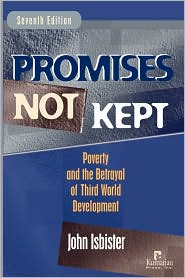However, from the same article, I can quote “But Congress has a moral obligation to protect American agriculture with legislation that will serve our national interests”. And I think that the reason is not only moral obligations but more concrete ones like lobbyis. This latter is just rational maximization of the self-interest of the corporations that reached a wealth level making a lobby in Washington affordable for them. It is now strategic rational choice! My point of view is that different theories accurately explain underdevelopment in different scales. It depends from where the issue is observed.
 PS. This book must be read to understand what is happening behind the scenes concerning the US foreign policy.
PS. This book must be read to understand what is happening behind the scenes concerning the US foreign policy.
From Wikipedia:
Confessions of an Economic Hit Man (ISBN 0-452-28708-1) is a book written by John Perkins and published in 2004. It tells the story of his career with consulting firm Chas. T. Main. Before employment with the firm, he interviewed for a job with the National Security Agency (NSA). Perkins claims that this interview effectively constituted an independent screening which led to his subsequent hiring by Einar Greve, a member of the firm (and alleged NSA liaison) to become a self-described "Economic Hit Man."














